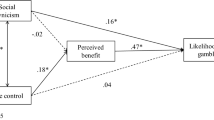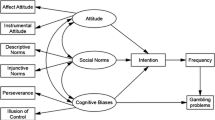Abstract
Problematic patterns of gambling and their harms are known to have culturally specific expressions. For ethnic Chinese people, patterns of superstitious belief in this community appear to be linked to the elevated rates of gambling-related harms; however, little is known about the mediating psychological mechanisms. To address this issue, we surveyed 333 Chinese gamblers residing internationally and used a mediation analysis to explore how gambling-related cognitive biases, gambling frequency and variety of gambling forms (‘scope’) mediate the association between beliefs in luck and gambling problems. We found that cognitive biases and scope were significant mediators of this link but that the former is a stronger mediator than the latter. The mediating erroneous beliefs were not specific to any particular type of cognitive bias. These results suggest that Chinese beliefs in luck are expressed as gambling cognitive biases that increase the likelihood of gambling problems, and that biases that promote gambling (and its harms) are best understood within their socio-cultural context.

Similar content being viewed by others

References
American Psychiatric Association. (2013). Diagnostic and statistical manual of mental disorders: DSM-5. Washington, DC: American Psychiatric Association.
Chang, P. T., Lee, J. H., Hung, K. C., Tsai, J. T., & Perng, C. (2009). Applying fuzzy weighted average approach to evaluate office layouts with Feng-Shui consideration. Mathematical and Computer Modelling, 50(9–10), 1514–1537. doi:10.1016/j.mcm.2008.07.038.
Chau, A. W., & Phillips, J. G. (1995). Effects of perceived control upon wagering and attributions in computer blackjack. Journal of General Psychology, 122(3), 253–269.
Chiu, J., & Storm, L. (2010). Personality, perceived luck and gambling attitudes as predictors of gambling involvement. Journal of Gambling Studies, 26(2), 205–227. doi:10.1007/s10899-009-9160-x.
Darke, P. R., & Freedman, J. L. (1997). The belief in good luck scale. Journal of Research in Personality, 31(4), 486–511. doi:10.1006/jrpe.1997.2197.
Davis, D., Sundahl, I., & Lesbo, M. (2000). Illusory personal control as a determinant of bet size and type in casino craps games. Journal of Applied Social Psychology, 30(6), 1224–1242.
Delfabbro, P. (2004). The stubborn logic of regular gamblers: Obstacles and dilemmas in cognitive gambling research. Journal of Gambling Studies, 20(1), 1–21.
Dunn, D. S., & Wilson, T. D. (1990). when the stakes are high—A limit to the illusion-of-control effect. Social Cognition, 8(3), 305–323.
Fernandez-Duque, D., & Wifall, T. (2007). Actor/observer asymmetry in risky decision making. Judgment and Decision Making Journal, 2(1), 1–8.
Fong, M. (2000). ‘Luck Talk’ in celebrating the Chinese New Year. Journal of Pragmatics, 32(2), 219–237.
Fong, D. K. C., & Ozorio, B. (2005). Gambling participation and prevalence estimates of pathological gambling in a far-east gambling city: Macao. UNLV Gaming Research & Review Journal, 9(2), 15–28.
Hernandez, M. D., Wang, Y. J., Minor, M. S., & Liu, Q. (2008). Effects of superstitious beliefs on consumer novelty seeking and independent judgment making: Evidence from China. Journal of Consumer Behaviour, 7, 424–435.
Holtgraves, T. (2009). Evaluating the problem gambling severity index. Journal of Gambling Studies, 25(1), 105–120.
Huang, L. S., & Teng, C. I. (2009). Development of a Chinese superstitious belief scale. Psychological Reports, 104(3), 807–819. doi:10.2466/Pr0.104.3.807-819.
Hwu, H. G., Yeh, E. K., & Chang, L. Y. (1989). Prevalence of psychiatric-disorders in Taiwan defined by the Chinese diagnostic interview schedule. Acta Psychiatrica Scandinavica, 79(2), 136–147.
Joukhador, J., Blaszczynski, A., & Maccallum, F. (2004). Superstitious beliefs in gambling among problem and non-problem gamblers: Preliminary data. Journal of Gambling Studies, 20(2), 171–180. doi:10.1023/B:Jogs.0000022308.27774.2b.
Ladouceur, R. (2004). Perceptions among pathological and nonpathological gamblers. Addictive Behaviors, 29(3), 555–565. doi:10.1016/j.addbeh.2003.08.025.
Ladouceur, R., & Sevigny, S. (2005). Structural characteristics of video lotteries: Effects of a stopping device on illusion of control and gambling persistence. Journal of Gambling Studies, 21(2), 117–131. doi:10.1007/s10899-005-3028-5.
Langer, E. J. (1975). The illusion of control. Journal of Personality and Social Psychology, 32(2), 311–328.
Lloyd, J., Doll, H., Hawton, K., Dutton, W. H., Geddes, J. R., Goodwin, G. M., et al. (2010). Internet gamblers: A latent class analysis of their behaviours and health experiences. Journal of Gambling Studies, 26(3), 387–399. doi:10.1007/s10899-010-9188-y.
Loo, J. M., Raylu, N., & Oei, T. P. S. (2008). Gambling among the Chinese: A comprehensive review. Clinical Psychology Review, 28(7), 1152–1166. doi:10.1016/j.cpr.2008.04.001.
Loo, J. M., Oei, T. P., & Raylu, N. (2011). Psychometric evaluation of the problem gambling severity index-chinese version (PGSI-C). Journal of Gambling Studies, 27(3), 453–466.
Mak, M. Y., & Ng, S. T. (2005). The art and science of Feng Shui—A study on architects’ perception. Building and Environment, 40(3), 427–434. doi:10.1016/j.buildenv.2004.07.016.
Martinez, F., Bonnefon, J.-F., & Hoskens, J. (2009). Active involvement, not illusory control, increases risk taking in a gambling game. Quarterly Journal of Experimental Psychology, 62(6), 1063–1071.
Ng, T., Chong, T., & Du, X. (2010). The value of superstitions. Journal of Economic Psychology, 31(3), 293–309. doi:10.1016/j.joep.2009.12.002.
Norton, M. I., & Gino, F. (2013). Rituals alleviate grieving for loved ones, lovers, and lotteries. Journal of experimental psychology. General. doi:10.1037/a0031772.
Oei, T. P., Lin, J., & Raylu, N. (2007). Validation of the chinese version of the gambling related cognitions scale (GRCS-C). Journal of Gambling Studies, 23(3), 309–322. doi:10.1007/s10899-006-9040-6.
Oei, T. P., Lin, J., & Raylu, N. (2008). The relationship between gambling cognitions, psychological states, and gambling—A cross-cultural study of Chinese and Caucasians in Australia. Journal of Cross-Cultural Psychology, 39(2), 147–161. doi:10.1177/0022022107312587.
Papineau, E. (2005). Pathological gambling in Montreal’s chinese community: An anthropological perspective. Journal of Gambling Studies, 21(2), 157–178. doi:10.1007/s10899-005-3030-y.
Preacher, K. J., & Hayes, A. F. (2008). Asymptotic and resampling strategies for assessing and comparing indirect effects in multiple mediator models. Behavior Research Methods, 40(3), 879–891.
Pritchard, D., & Smith, M. (2004). The psychology and philosophy of luck. New Ideas in Psychology, 22(1), 1–28. doi:10.1016/j.newideapsych.2004.03.001.
Raylu, N., & Oei, T. P. (2004a). The gambling related cognitions scale (GRCS): Development, confirmatory factor validation and psychometric properties. Addiction, 99(6), 757–769. doi:10.1111/j.1360-0443.2004.00753.x.
Raylu, N., & Oei, T. P. (2004b). Role of culture in gambling and problem gambling. Clinical Psychology Review, 23(8), 1087–1114.
Rothbaum, F., Weisz, J. R., & Snyder, S. S. (1982). Changing the world and changing the self: A two-process model of perceived control. Journal of Personality and Social Psychology, 42(1), 5–37.
Shaffer, H. J., Hall, M. N., & Vander Bilt, J. (1999). Estimating the prevalence of disordered gambling behavior in the United States and Canada: A research synthesis. American Journal of Public Health, 89(9), 1369–1376.
Social Sciences Research Centre (2005). A study of Hong Kong people’s participation in gambling activities, December, 2005. Hong Kong: Home Affairs Bureau, Government of the Hong Kong Special Administrative Region.
Spector, P. E., Sanchez, J. I., Siu, O. L., Salgado, J., & Ma, J. (2004). Eastern versus Western control beliefs at work: An investigation of secondary control, socio instrumental control, and work locus of control in China and the US. Applied Psychology, 53(1), 38–60.
Strickland, L. H., Lewicki, R. J., & Katz, A. M. (1966). Temporal orientation and perceived control as determinants of risk-taking. Journal of Experimental Social Psychology, 2(2), 143–151. doi:10.1016/0022-1031(66)90075-8.
Tang, C. S. K., & Wu, A. M. S. (2010). Direct and indirect influences of fate control belief, gambling expectancy bias, and self-efficacy on problem gambling and negative mood among chinese college students: a multiple mediation analysis. Journal of Gambling Studies, 26(4), 533–543. doi:10.1007/s10899-010-9177-1.
Tao, V. Y. K., Wu, A. M. S., Cheung, S. F., & Tong, K. K. (2011). Development of an indigenous inventory GMAB (Gambling Motives, Attitudes and Behaviors) for Chinese Gamblers: An exploratory study. Journal of Gambling Studies, 27(1), 99–133. doi:10.1007/s10899-010-9191-3.
Toneatto, T., Blitz-Miller, T., Calderwood, K., Dragonetti, R., & Tsanos, A. (1997). Cognitive distortions in heavy gambling. Journal of Gambling Studies, 13(3), 253–266.
Tsang, E. W. (2004). Superstition and decision-making: Contradiction or complement? The Academy of Management Executive, 18(4), 92–104.
Wardle, H., Moody, A., Spence, S., Orford, J., Volberg, R., Jotangia, D., et al. (2010). British gambling prevalence survey 2010. National Centre for Social Research.
Winslow, M., Cheok, C., & Subramaniam, M. (2015). Gambling in Singapore: An overview of history, research, treatment and policy. Addiction, 110(9), 1383–1387.
Wohl, M. J. A., Stewart, M. J., & Young, M. M. (2011). Personal Luck Usage Scale (PLUS): Psychometric validation of a measure of gambling-related belief in luck as a personal possession. International Gambling Studies, 11(1), 7–21.
Wood, R. T., & Griffiths, M. D. (2007). Online data collection from gamblers: Methodological issues. International Journal of Mental Health and Addiction, 5(2), 151–163.
Zheng, W. Y., Walker, M., & Blaszczynski, A. (2010). Mahjong gambling in the Chinese-Australian community in sydney: A prevalence study. Journal of Gambling Studies, 26(3), 441–454. doi:10.1007/s10899-009-9159-3.
Zhou, K., Tang, H., Sun, Y., Huang, G. H., Rao, L. L., Liang, Z. Y., et al. (2012). Belief in luck or in skill: Which locks people into gambling? Journal of Gambling Studies, 28(3), 379–391.
Funding
This study was completed as part of a doctoral thesis and no external sources of funding were sort.
Author’s Contribution
MSML and RDR designed the study, wrote the protocol and conducted literature searches. MSML organized the data collection and conducted the statistical analysis. MSML and RDR wrote the final manuscript.
Author information
Authors and Affiliations
Corresponding author
Ethics declarations
Conflict of interest
All other authors declare that they have no conflicts of interest relevant to the work presented here.
Ethical Approval
All procedures performed in studies involving human participants were in accordance with the ethical standards of the institutional and/or national research committee and with the 1964 Helsinki declaration and its later amendments or comparable ethical standards. This article does not contain any studies with animals performed by any of the authors.
Electronic supplementary material
Below is the link to the electronic supplementary material.
Rights and permissions
About this article
Cite this article
Lim, M.S.M., Rogers, R.D. Chinese Beliefs in Luck are Linked to Gambling Problems via Strengthened Cognitive Biases: A Mediation Test. J Gambl Stud 33, 1325–1336 (2017). https://doi.org/10.1007/s10899-017-9690-6
Published:
Issue Date:
DOI: https://doi.org/10.1007/s10899-017-9690-6



